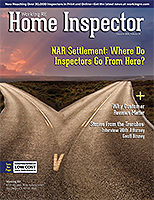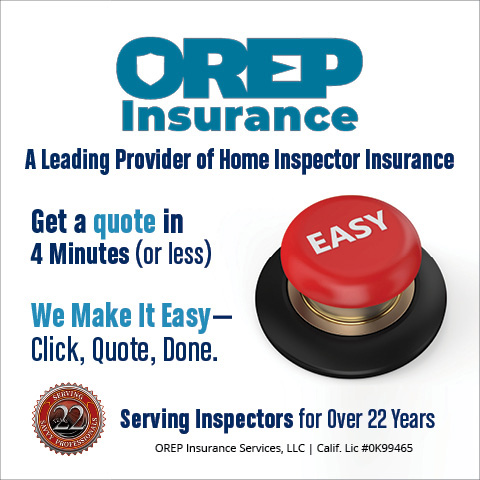 | > E&O/GL Insurance for Home Inspectors Competitive Rates, Broad Coverage, Free Risk Management, online inspection support for tough questions, discounts on education and more… Professional Coverage, Competitive Pricing Shop OREP today! |
Is It Time to Be Your Own Boss?
by Kendra Budd, Editor
To join a home inspection company, or to not join a home inspection company? That is the question that many newer inspectors find themselves juggling with.
After the COVID-19 pandemic, there seemed to be a surge in independence that extended to the workplace. Many find themselves wanting to be more in control of their time, especially when it comes to the coveted work-life balance, which is why many new home inspectors are considering becoming independent business owners instead of joining up with an inspection company.
What exactly are the benefits of becoming a self-employed home inspector? Well, Working RE Home Inspector sat down with Dan Cullen—an inspector who has been his own boss for the past 27 years to answer that question.
A Change of Pace
Dan Cullen wasn’t always a home inspector; in fact, he was a firefighter for over 30 years. Cullen had never even considered home inspecting as a job prospect, until another one of the firefighters he worked with took it up as a side job.
Cullen’s friend began working under another home inspector in the area, “and he told me that the inspector was still looking for help. I applied and started doing my training,” Cullen explains. What started as a job to earn some extra cash soon became Cullen’s new passion—working for the inspector for nearly three years before starting his own solo venture.
The Benefits of Solo Inspection
Once Cullen transitioned from trainee to full-time freelance solo inspector, he immediately started seeing the benefits that he wouldn’t otherwise see working under a company. The first of which is financial freedom. “You’ve got an opening to be responsible for only yourself, which can give you an immense amount of financial freedom,” Cullen states. Some examples include: lower carrying costs, exemption from workman’s comp, and even slightly lower insurance coverage.
You’ll also have a higher earning potential overall because there is no cap on how much you’ll make. “The more home inspections I do, the more money I make,” Cullen enlightens. In fact, there is a potential to earn a higher wage per week while working less hours than a typical 40-hour work week if you were to work under a company.
Besides the financial benefits, there are also a couple of personal ones you’ll get as well. As a solo home inspector, you’ll have the option to choose your hours—meaning your work-life balance can actually be just that … balanced!
Cullen says another benefit often overlooked is making a name for yourself in your community. “I’ve been in the business for over 25 years and I have thousands of clients. I’ve got a low-level pipeline that continually feeds me work. I don’t have to go out there and grind for work—the phone just rings a few times a week and I do inspections quite often,” Cullen details. Once you have a positive reputation, the work will find its way to you.
So, how feedid Cullen build his reputation exactly when the work came to him? Well, that is due to another benefit of solo home inspection—setting your own prices. “Clients know that I am going to set a reasonable fee, and that’s why they want to work with me,” Cullen shares.
All of these benefits tie into the fact that you get to be your own boss. Every choice you make is your own, and you don’t have to constantly be looking over your shoulder. If you’re looking to have a more cost-effective approach to your inspection work, set your own hours, and be your own boss, then solo inspection can open up those opportunities.
(story continues)
The Downsides
Unfortunately, solo home inspection doesn’t come without its challenges. When it comes to the lucrativeness of solo inspection, Cullen says it all depends on your local market. “You have to ask yourself, what kind of inspection fees can your local market sustain? Are you optimizing your fee schedule, or doing ancillary inspection work? It all depends on a lot of factors,” emphasizes Cullen.
Cullen credits his business success to the area he lives in. “I was fortunate enough to start working in a metropolitan area with a significant ongoing demand for home inspections,” he says. If you’re working in an area that doesn’t have a lot of demand for home inspections, especially in the slower seasons, then you really need to ask yourself if freelancing is the right choice.
Cullen also warns that even though you can lower your inspection costs as a solo inspector, you’ll still need to make sure you’re not short-changing yourself for a variety of reasons. “I still have to pay for software, recurring monthly fees, licensing fees, my InterNACHI and local ASHI chapter membership fees, etc. You’re not going to be able to absorb those ongoing costs the same as if you had other inspectors working for you. So, you have to price your work according to those additional fees,” Cullen elaborates.
You’ll have to do some serious accounting work to make sure that your services are both fair and going to cover your fees to keep your business running. It all goes back to making sure you’re doing enough home inspections throughout the year, which means you may even have to raise your prices during slower months. Otherwise, what starts as a way to make more money, could just end up sinking your business. Solo inspection is a risk—one you must dutifully weigh the pros and cons of before diving in head first.
How to Get Started
Most freelance solo inspectors don’t start off as such, Cullen included! When Cullen mentors prospective solo home inspectors, he actually insists that they start in a multi-inspector firm. “They need to get their feet wet, and learn the ropes because they’re bound to make some initial mistakes. It’s nice to have someone else responsible for you during that learning process,” Cullen explains. However, that isn’t to say that it doesn’t work to start off solo either. In fact, Cullen says he’s had many mentees that “hit the ground running.”
Education is also extremely important to the process. Knowledge is power in the home inspection industry, and if you don’t know the laws and regulations surrounding your work then you’ll have a harder time succeeding. Unfortunately, education is also not a guarantee you’ll be successful. What it really all comes down to though, in Cullen’s opinion, is tenacity. “I used to have my own home inspection education firm for several years, and it just got really hard to predict who would actually be able to take that education and make something out of it,” Cullen reflects. Still, that education will give you a leg up against other inspectors who don’t obtain it.
According to Cullen, success in this business all comes down to drive. “You need to be a serious self-starter who’s willing to do that extra legwork of marketing and assembling all the technical information necessary to become a really proficient home inspector,” he tells us. You might not be able to get started right out of the gate and see immediate success, but it is the inspectors with the high-performance ethic that get to see the results.
Final Thoughts
So, is it time to finally be your own boss? Well, that comes down to your work ethic, marketability, and location. If those all seem easily obtainable, then it might be time to consider freelancing.
Cullen leaves us with a few words of advice to those who are considering it, “Get insurance, learn how to market yourself, and consider taking advantage of the resources organizations, such as InterNACHI, provide.” Freelancing may not be for every home inspector, but it can be invaluable to those who really feel they can benefit from it. Take Cullen, for example, who has been solo for over 25 years. Just make sure you take the proper time to consider whether it’s the best option for you personally.
Stay safe out there!
About the Author
Kendra Budd is the Editor of Working RE Magazine and Marketing Coordinator for OREP Insurance. She graduated with a BA in Theatre and English from Western Washington University, and with an MFA in Creative Writing from Full Sail University. She is currently based in Seattle, WA.
OREP Insurance Services, LLC. Calif. License #0K99465


